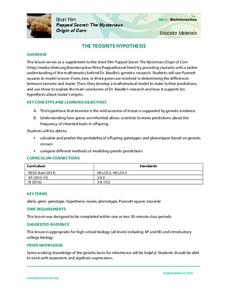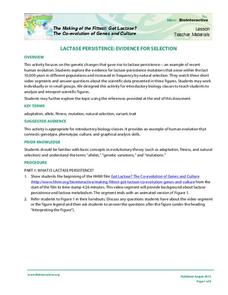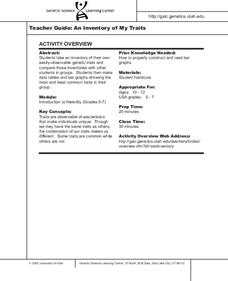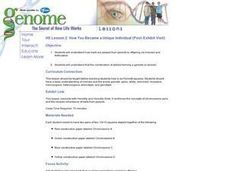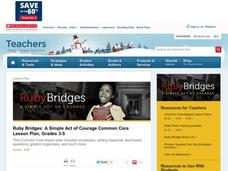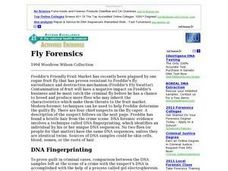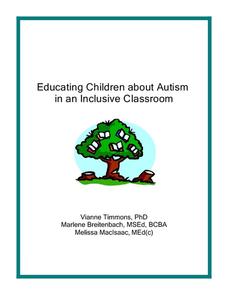Missouri Department of Elementary
Character Clovers
Build a classroom community with a lesson that uses character clovers to examine scholars' roles. Following a whole-class discussion, participants list four roles they play and accompany it with the character traits that go along with it.
Core Knowledge Foundation
Genetics and the Master Race
How did the beginnings of genetic research influence the Nazi party? A thorough, engaging unit incorporates the work of Gregor Mendel, the study of inherited traits, and the use of racism and discrimination during the Holocaust.
Discovery Education
Blueprint for Life
DNA is the code for all biological traits, both plant and animal. Using an exploratory lesson, learners begin to explore the concept of a biological code by decoding word puzzles. They then extract DNA from plant cells using detergent to...
Missouri Department of Elementary
Acting Out Respect and Compromise
Puppets showcase the importance of being a good friend. Following a discussion about positive character traits, scholars create a paper-bag puppet and role-play scenarios with a peer.
Missouri Department of Elementary
How Do I Act Like a Friend?
Familiar puppets set the stage for a thoughtful discussion about friendship. To show what they know, scholars role-play scenarios. Peers offer a thumbs up when they view positive character traits exhibit good friend behavior.
Howard Hughes Medical Institute
The Teosinte Hypothesis
Don't want to sound corny, but your class will be a-maize-d by an engaging activity! Explore the history of the modern corn plant through a video and Punnett squares. Junior genetics experts get hands-on experience with actual research...
Illinois Department of Natural Resources
Section One: What is Biodiversity?
Four intriguing and scientific activities invite learners to explore the natural resources of their town. The activities cover concepts such as genetic traits, organizing species in a taxonomy, the differences between different species...
Kenan Fellows
Unit 3: Genetic Variation
What happens when genes change? Junior genetic investigators examine the effects of mutation in the third unit of a four-part Biotechnology series. Individuals discover the types of mutations through a series of PowerPoints, then partner...
Missouri Department of Elementary
I’m Thumbody!
Positive and negative thinking is the focus of a instructional activity that boost self-awareness. Beginning with a whole-class discussion, scholars brainstorm what positive thinking looks and sounds like then compares and contrast the...
Novelinks
The True Confessions of Charlotte Doyle: Problematic Situations
When is it okay to go against authority and what can happen if you do? This is the leading question in this activity to accompany your classroom reading of The True Confessions of Charlotte Doyle by Avi. After reading chapter eight,...
Howard Hughes Medical Institute
Lactase Persistence: Evidence for Selection
What's the link between lactase persistence and dairy farming? Biology scholars analyze data to find evidence of the connection, then relate this to human adaptation. Working individually and in small groups, learners view short video...
Missouri Department of Elementary
Are You Balanced?
Balance scales create a strong visual of how an individual prioritizes one's self alongside their commitments to the community, school, and home. Scholars complete a graphic organizer then discuss their findings with their peers. A...
Curated OER
An Inventory of My Traits
Students take an inventory of their own easily-observable genetic traits and
compare those inventories with other students in groups. They then make
data tables and bar graphs showing the most and least common traits in their group.
Curated OER
How You Become a Unique Individual
Students investigate how traits are passed from parents to offspring via meiosis and fertilization. They recognize that the combination of alleles forming a gamete is random.
Curated OER
The Effect of Natural Selection on Genes, Traits and Individuals
Rotating through five stations, evolutionary biologists explore the question of how changes in DNA facilitate the changes in a population over time. High-quality, colorful cards of animals, skeletons, skulls, and DNA sequences can all be...
Scholastic
Ruby Bridges: A Simple Act of Courage, Grades 3-5
Through character trait graphic organizers, a vocabulary sorting activity, class discussion, and a civil rights movement slide show, your young historians will be introduced to the amazing story of Ruby Bridges and her experiences as the...
Curated OER
"Easter" Egg Genetics
Using plastic Easter eggs to represent parent phenotypes, genetics enthusiasts simulate the passing of alleles. They record the phenotype of each half of the egg, one representing the mother's and one representing the father's. They...
ReadWriteThink
The Chinese New Year Starts Today
As part of a celebration of Chinese New Year, class members research the Chinese zodiac and examine the description of the personality attributes associated with the animal of their birth year. Individuals then craft a persuasive essay...
Curated OER
Fly Forensics
Freddy's Friendly Fruit Market is under attack by fruit flies, and it is up to your aspiring biologists to solve the crime! By reading and analyzing the phenotypes, detectives determine which fly is responsible. This memorable assignment...
Talking with Trees
What is Respect?
Inspire scholars to be the best they can be with a worksheet featuring the character trait, respect. Individuals read multiple scenarios, match their outcomes, and identify whether the behavior was respectful or disrespectful.
Overcoming Obstacles
Having a Positive Attitude
Through discussion and reflection, scholars discover what it means to have a positive attitude, that an individual can choose to stay positive, and discuss the benefits of a positive attitude. Learners listen to negative scenarios to...
Curated OER
Educating Children about Autism in an Inclusive Classroom
How do we meet the needs of learners with autism? Find out with an in-depth study that offers a thorough explanation of autism—what it is and how unique every individual's case may be, nine lesson plans spanning from kindergarten to 12th...
Curriculum Corner
It's Been a Wildly Exciting Year!
Take time at the end of the year to celebrate the amazing qualities and achievements of your learners with these printable awards. Offering a list of dozens of ways to recognize the individuals in your class, this resource is a great way...
Workforce Solutions
Discover Your Interests
Career exploration is the focus of a lesson that encourages pupils to choose a profession based on their strengths and interests. Following a thoughtful discussion covering different character traits, class members complete an interest...







